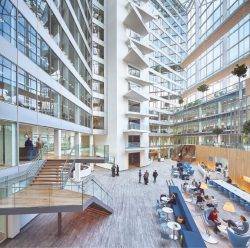February 9, 2018
London office market is booming and proving resilient in the face of Brexit
 A new report from Knight Frank claims that activity in the office market in London increased sharply last year, which the property adviser said was driven largely by growing demand from the UK’s burgeoning tech sector. The report said office leasing activity in central London hit 13.84 million sq ft last year, more than 2 million sq ft than in 2016. Knight Frank said it had seen ‘extraordinary demand’ for London offices from the Technology, Media and Telecommunications (TMT) sector. However, the report also claims that there is now a lack of quality office space supply because, despite the fact that more than 259 development schemes are under construction in Central London, 187 are residential, and of the remaining 72 offering commercial space, only two-thirds are available to lease, with many of them already pre-let to office tenants.
A new report from Knight Frank claims that activity in the office market in London increased sharply last year, which the property adviser said was driven largely by growing demand from the UK’s burgeoning tech sector. The report said office leasing activity in central London hit 13.84 million sq ft last year, more than 2 million sq ft than in 2016. Knight Frank said it had seen ‘extraordinary demand’ for London offices from the Technology, Media and Telecommunications (TMT) sector. However, the report also claims that there is now a lack of quality office space supply because, despite the fact that more than 259 development schemes are under construction in Central London, 187 are residential, and of the remaining 72 offering commercial space, only two-thirds are available to lease, with many of them already pre-let to office tenants.








 The creative team behind the development of the world’s most sustainable building – The Edge in Amsterdam – has announced the launch of a real estate technology company. EDGE Technologies, launched by OVG Real Estate CEO Coen van Oostrom will focus on creating a new generation of buildings which feature the latest innovations in sustainability and wellbeing. Whereas parent company OVG is focussed exclusively on the development of its existing portfolio, EDGE Technologies will focus on both the development and the long-term operations of this new generation of buildings, aiming for a cohesive experience across cities. Each EDGE building will be built and operated on the same technology platform and offer consistent user-centred design, created to serve the needs of today’s fast-changing and demanding workforce. To help achieve this the new company is launching a product that will capture and aggregate data across its properties in order to optimize, measure and inform both the user experience and the building’s environmental performance.
The creative team behind the development of the world’s most sustainable building – The Edge in Amsterdam – has announced the launch of a real estate technology company. EDGE Technologies, launched by OVG Real Estate CEO Coen van Oostrom will focus on creating a new generation of buildings which feature the latest innovations in sustainability and wellbeing. Whereas parent company OVG is focussed exclusively on the development of its existing portfolio, EDGE Technologies will focus on both the development and the long-term operations of this new generation of buildings, aiming for a cohesive experience across cities. Each EDGE building will be built and operated on the same technology platform and offer consistent user-centred design, created to serve the needs of today’s fast-changing and demanding workforce. To help achieve this the new company is launching a product that will capture and aggregate data across its properties in order to optimize, measure and inform both the user experience and the building’s environmental performance. 
 Financial services organisations are reducing the amount of commercial office space they require as they adopt more flexible work styles. This is according to a new report from HOK’s US team,
Financial services organisations are reducing the amount of commercial office space they require as they adopt more flexible work styles. This is according to a new report from HOK’s US team, 






 The proportion of flexible space within occupier portfolios will continue to increase in 2018; a growing adoption of technology will redefine buildings, workplaces and portfolios; and it will be a year of decision for many businesses regarding Brexit. These are among the ‘UK Property Predictions 2018’ report from JLL which covers a range of different topics, with a particular focus on UK corporate occupiers. The report claims that traditional static portfolio concepts are being redesigned to incorporate new formats of space, co-working and a more fluid and diverse range of space options that support creativity, innovation and collaboration.
The proportion of flexible space within occupier portfolios will continue to increase in 2018; a growing adoption of technology will redefine buildings, workplaces and portfolios; and it will be a year of decision for many businesses regarding Brexit. These are among the ‘UK Property Predictions 2018’ report from JLL which covers a range of different topics, with a particular focus on UK corporate occupiers. The report claims that traditional static portfolio concepts are being redesigned to incorporate new formats of space, co-working and a more fluid and diverse range of space options that support creativity, innovation and collaboration. 







